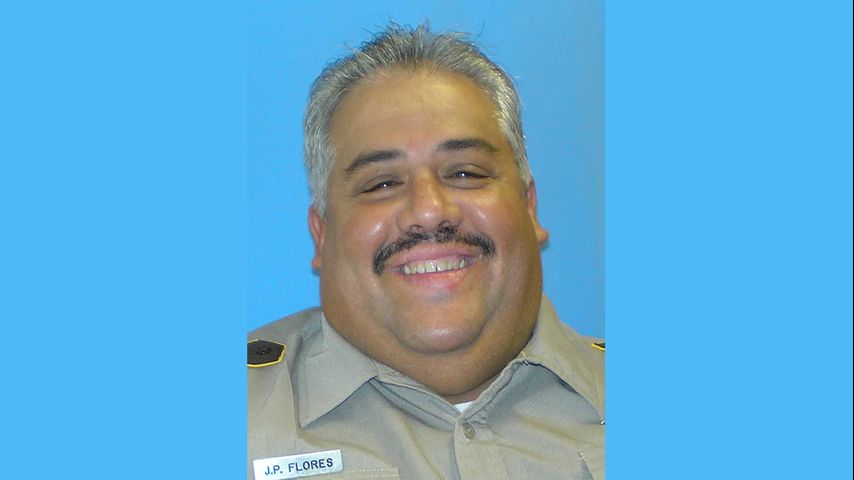Former Hidalgo County Crime Stoppers coordinator released from prison
The U.S. Bureau of Prisons released former Hidalgo County Crime Stoppers Coordinator J.P. Flores last week.
James Phil “J.P.” Flores, 53, of Edinburg — a former Hidalgo County Sheriff’s Office deputy who handled the Crime Stoppers program from 2001 to 2012 — served nearly six years in prison for drug trafficking.
Flores, six other sheriff’s deputies and two Mission police investigators were convicted in the Panama Unit scandal. Sheriff Guadalupe “Lupe” Treviño and Cmdr. Jose Padilla pleaded guilty in separate but related corruption cases.
“It was not only Crime Stoppers,” said Sheriff J.E. “Eddie” Guerra. “It was the trust broken throughout the community because of what they did and, ultimately, what the sheriff did.”
Flores graduated from Edinburg High School and studied police administration at Pan American University, according to Hidalgo County personnel records. He joined the Sheriff’s Office in 1985.
After a six-year stint at the Hidalgo County jail, where he worked as a detention officer, Flores became a sheriff’s deputy.
The Sheriff’s Office assigned him to Deputy Jorge Garza for training. During the next two decades, Flores and Garza became friends.
They worked together. They rode motorcycles together. And when a drug trafficker approached them, Flores and Garza broke the law together.
A grand jury indicted them on federal drug trafficking charges in April 2013.
Flores discussed their friendship that August, when he testified against Garza at the federal courthouse in McAllen.
During the Treviño administration, deputies felt pressured to support his re-election campaigns, Flores said, according to trial transcripts.
Flores asked Julio Davila, a friend from high school, to support the sheriff’s re-election campaign. Davila introduced Flores to Fernando Guerra Sr., a drug trafficker from northeast Hidalgo County.
“And that’s where the favors start coming along,” Flores said, according to trial transcripts.
Fernando Guerra asked Flores to search for license plate numbers in law enforcement databases.
After he became comfortable with the arrangement, Fernando Guerra asked Flores and Garza to conduct traffic stops.
Sometimes the traffic stops allowed Fernando Guerra to steal drugs from a supplier. Sometimes he just wanted to identify the driver.
An informant told federal agents that Flores and Garza conducted “approximately twenty” fraudulent traffic stops, according to court records. Asked during the trial, Flores said “probably eight to ten.”
In November 2012, when a traffic stop allowed Fernando Guerra to steal 22 kilograms of cocaine, Flores said he received “like $10,000.”
Flores also became a middleman between Fernando Guerra and the Panama Unit, an anti-narcotics squad filled with corrupt cops.
Fernando Guerra provided Flores with information about rival drug traffickers, according to trial transcripts. Flores passed the information to members of the Panama Unit, who robbed them.
“Isn’t it true that by the end of 2012, you were a full-on drug trafficker as Guerra Sr. was?” Garza’s attorney, Lilly Ann Gutierrez, asked Flores during the trial.
“Yes,” Flores said, according to the transcript.
On April 29, 2014, U.S. District Judge Randy Crane sentenced Garza to 10 years in prison. After the U.S. Sentencing Commission changed the federal guidelines for drug-related crimes, Crane reduced the sentence to eight years.
Flores served nearly six years. The Bureau of Prisons released him to “community confinement” on May 6.
“Community confinement means the inmate is in either home confinement or a Residential Reentry Center (RRC, or halfway house),” according to a statement released by the Bureau of Prisons. “For safety reasons, we do not specify an individual’s specific location.”
Flores couldn’t be reached for comment. Attempts to contact him through friends and associates were unsuccessful.
The scandal forced Sheriff Guerra, who replaced Treviño, to temporarily shut down the Crime Stoppers program. The Sheriff’s Office conducted a top-to-bottom review, drafted new policies and appointed new Crime Stoppers board members.
“Once they did that we re-established the program,” Sheriff Guerra said.
Restoring public trust, however, remains an ongoing process.
“Having someone take anonymous tips to turn over to the drug smugglers is like getting a coyote to take care of your chickens,” said Robert Caples, a former anti-corruption activist who is now the commander of the Starr County Special Crimes Unit. “I don’t know if or how it impacted Crime Stoppers lines, but after that happened, I would’ve never advised anyone to call that particular line with sensitive information.”
Members of the Treviño administration still work in law enforcement, Caples said, despite the damage they caused.
“As far as J.P., he’s paid his debt to society. It’s time for him to get back to life,” Caples said. “Nothing wrong with that. It’s how it works.”





